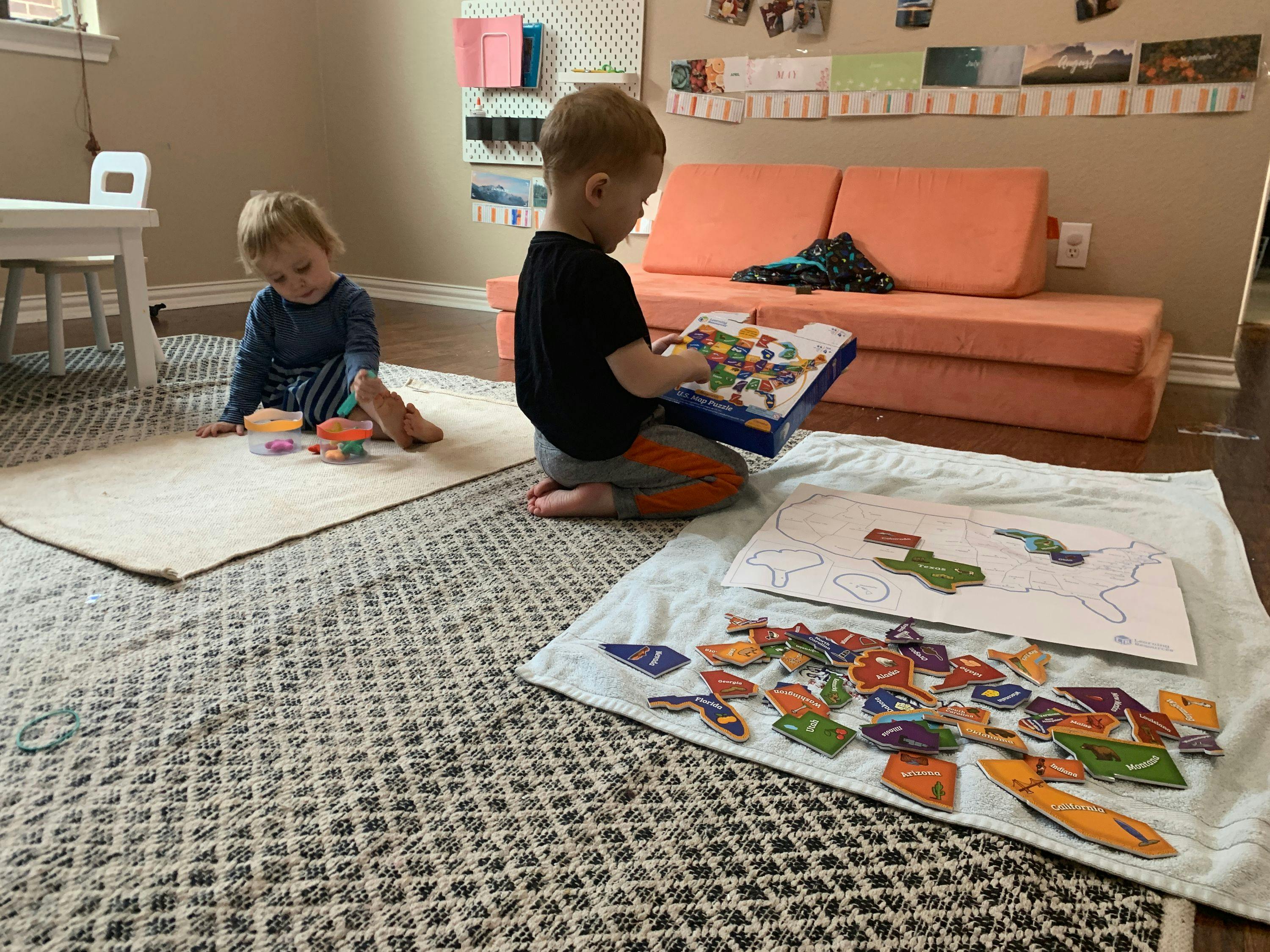3 (Stress-Free) Tips for Starting Montessori at Home
Jenna Wawrzyniec
Content Specialist
In light of the coronavirus pandemic sweeping our nation and world, schools everywhere have moved to closures. Many of us parents are abruptly feeling a spotlight placed on our home environments and routines. How can we support our children at home, and where would we even begin with implementing Montessori?
Getting started in any major life shift can feel overwhelming, but that is precisely where Montessori at home can help. It has been a foundation for our family that gives us a sense of order and calm, and where there is order and calm, we can finally step out of reactive mode – what did you do? – to responsive mode – what do you need so that you can be successful at what you’re trying to do?
Here are 3 stress-free tips for taking those first steps into Montessori at home:
1. First, observe.
Before you rush to cultivating activities and placing out toys, there is one preparation that I learned from Montessori that makes these efforts more successful. And no, it has nothing to do with buying expensive stuff!
Observation is a pillar of the Montessori classroom, and the same is true for adding it to our Montessori parenting toolbox. I carve out neutral moments throughout our day to watch how my children are interacting with their environment. These few-minute check-ins with my children must be agenda-free, otherwise I will start unintentionally inserting myself. When I see them through a more objective lens, the more clear their capabilities and interests become.
When I observed them this week, I noticed my son seemed particularly interested in counting and the concept of time, and my daughter just wants to keep moving. Neutrally honoring their interests helps me narrow down how to guide them at home, and it keeps them connected to meaningful choices.
2. Cultivate your home to include your children
Shelf work and independent play is realistically a small fraction of our day at home. Our young toddlers and preschoolers crave connection, movement as much as they crave the opportunity to be independent, but sometimes as parents we get so hooked on Montessori as something that solely promotes independence that we get frustrated when our children boomerang back to us. Independence is a journey, and it cannot be forced.
This is something that helps me set realistic expectations. Practical life is a huge area that I copy from the classroom to our home that satisfies the acquisition of independence, but also honors movement and connection. I do not exclude my children from happenings in our home; I invite them to work with me. A step stool invites them to prep food on our kitchen counter; a child-sized vacuum helps them sweep up the floors just as I do; and laundry is not something that I reserve for nap-time. Carrying loads of clothes back to their bedroom is one of their favorite contributions!
And no, this does not require a magical reserve of patience as a parent, but it does require surrendering a bit of control over how perfectly things get done. If you can surrender to the latter, I find that patience is restored because it is much easier to integrate my children into our family routine than it is to try to juggle a segregated routine.
3. Lead with Honesty
Montessori taught me that children in these early years are wired to analyze and categorize the real world around them through their absorbent minds and foundational sensitive learning periods. This was a stark difference to how society conditioned me to see them from birth, as somehow too young to have access to concrete reality. This was a game-changer for us in many aspects of our parenting, but one of my favorite changes that concrete learning inspired was our commitment to a family honesty policy. I give them real answers, whether it’s factual information to all their “why” questions, and I also give them real answers behind the limits and boundaries I need to set.
Of all pillars to Montessori, why is this valuable to start with? When we are abruptly thrown in this new dynamic of working from home with our children during these school closures, honesty can be immensely grounding for everyone. If we put pressure on ourselves to shelter our children from how we are feeling, how we are coping, and why we are making some changes, we can unintentionally add to the stress.
- I am honest about why we are learning from home with basic information about the coronavirus.
- I am honest and inclusive about the work they see me needing to do from home.
- I am honest about the reasons behind changes and limits I am asking of them at home.
- And, most importantly, I am honest when I don't have all of the answers.
These three Montessori pillars don’t solve for all the challenges that humbly arise on the home front, but they do help us maintain order, restore calm, and connect in meaningful ways.
Jenna Wawrzyniec
Jenna is a trained journalist and writer whose parenting journey transformed after implementing Montessori at home with her three children. She is a passionate advocate for bridging Montessori to the mainstream as a means to build community, empower parent-child relationships, and honor learning as the lifelong journey that it is.
Sign up for our newsletter
Get started with our community today! Sign up for resources.
